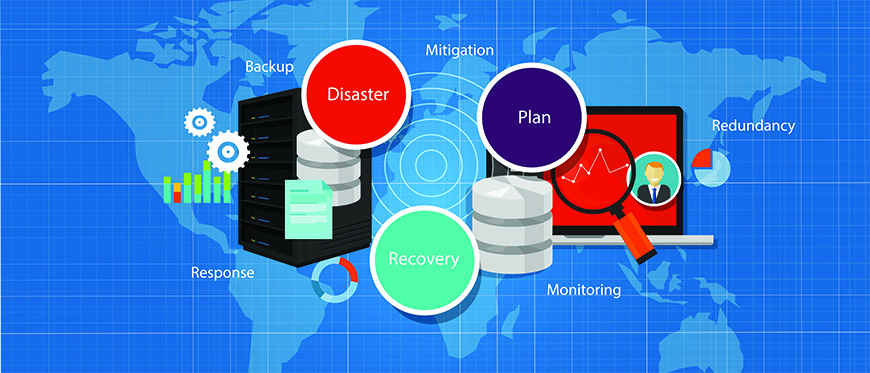Having a proper backup and disaster recovery plan is an essential component to every business - yet is so often overlooked. Whether you’re a large corporation or a small business, you have business data that you wouldn't want to lose. So why aren’t you protecting it?
Think about it, could you imagine walking into your office one day, and finding out that your data was lost? Accounts receivable, customer and prospect contact information, confidential files, important documents that help you run your business - all gone. Imagine even just one day of transactions were lost. Would you be able to remember everything that happened that day and re-enter it into your system? The facts are most businesses can’t survive after a major data loss, and even minor ones can have serious consequences.
If you’re thinking to yourself “That won’t happen to me,” “We’re too small to get attacked,” or “I have other things to worry about,” think again. Even if you are backing up your data, when was the last time you tested your backups? Are you absolutely sure your data is recoverable in the event of a disaster?
Data loss is not a matter of if, it’s a matter of when – it happens to every company big or small. Yes even Sony, Microsoft, or Google, the difference is they have a plan in place and can recover the data promptly to continue their operations.
Here are nine things you need know in order to be prepared for the unexpected.
- Potential incidents are vast
When it comes to business crises, many of us think purely about large-scale natural disasters – fires, floods, earthquakes, and similar scenarios. But smaller scale incidents can cause just as much damage, or leave you with prolonged system outage that can cost a fortune in lost revenue. Frequently data loss can be caused just by a simple mistake by one of your employees. Don’t discount the potential of insider theft or accidental damage, or the growing danger of cyber crime.
With data an ever-growing component to the success of our businesses, the consequences of any of these scenarios might be bigger than you imagine. Without reliable backups and a recovery plan, could you accurately predict the state your company would be in? Chances are it would mean major issues.
- Forward planning is peace of mind
Regrettably, IT security is never something that can be ‘set and forget’. For it to be worthwhile it takes meticulous planning and monitoring. That’s especially true with backup and disaster recovery systems. When an incident has already taken place, it’s probably too late to be thinking about data safeguarding and recovery. Hence why our company lives by our mantra “Because Tomorrow is too late.” Ensuring a reliable backup system and identifying a post-crisis recovery procedure are things your business needs to be thinking about today.
- Test, test and test again
It’s one thing knowing you have backups, but quite another knowing they’ll work and you’ll be able to get back online fast enough to avoid reputational damage. Days or weeks out of routine operations can be the difference for many organizations between recovering and not. To ensure your business survives a crisis, your backup procedures should include regular testing that ensures they are the most appropriate fit to your company’s specific needs.
- Backup choices are numerous
Many business owners find the wide variety of backup options a curse rather than a blessing. Multiple options can make it hard to know which is the right one for you. And it’s vital that you choose a system that’s designed to do what your business situation requires. It’s important to note this solution won’t necessarily be the same as one of your competitors.
- Avoid tape backups
If there’s one kind of backup technology you want to avoid, it’s tape. While it may have had its merits back in the day– nowadays it’s well and truly obsolete. Not only are other backup technologies now cheaper, but more reliable. To put in perspective, we have not sold a tape solution in over eight years
- The cloud is the future
If you want a stress-free approach to backup technologies, then the cloud is probably for you. Simply put, Cloud Backup gives you the extra peace of mind of a robust, secure, off-site storage location, while taking away the hassle of manually backing up data onto physical media. Since your backup is accessible from anywhere in the world, in the aftermath of a disaster, you’re not restricted to operating in your usual office if it was damaged by flood or fire. For legal reasons and speed of recovery it is also advisable to know where your cloud backup is stored.
- Don’t miss a spot
Your organization probably has more business-critical data than you realize. We’re not just talking about documents. Although these probably contain commercially sensitive information and should be first priority, chances are you would struggle without less considered aspects of your infrastructure - like e-mails, browser preferences, and bookmarks. By opting for image-based backups, you’ll ensure you have a complete mirror image of your previous system accessible after disaster strikes. With conventional file-based backups you will only regain access to your basic files. It is important to remember that there's a difference between having access to your data, and having your data in a working state. You want backup solutions that can return your data so efficiently that it appears data loss had not even occurred in the first place.
- Off-site is essential
You might not choose to take our recommendation to consider cloud backup – that’s something that comes down to your business’s own circumstances. But whatever you do, one thing is essential: off-site backups. If you only have one copy of your system’s backup at your office, and a flood, fire or theft destroys the copy, then a backup was useless in the first place. On the other hand, having a secondary copy at a secure off-site location will ensure you’re covered whatever happens.
- There’s no one-size-fits-all
No-one denies that every business should have some form of backup system in place. And not just any backup, but one that's customized and the right fit. To get started with thinking about what your business needs, consider how long you could realistically be out of action before you started feeling the effects. That’s a question with a million different answers depending on your industry and what your company specifically does – but it will give you an idea of the backup solution that’s best suited for your requirements.
If this all sounds like too much of a headache, and you want peace of mind that your backup worries are taken care of, then sign up for a Free Data Risk Assessment from Constant C. Call (204) 272.1458 today, Because tomorrow is too late.


